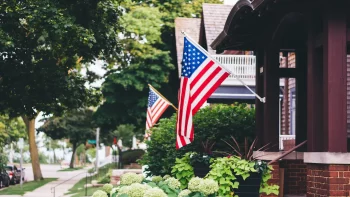
VA home mortgages are a great choice for Charlotte home buyers that have eligibility. There aren’t many loan programs that offer 100% financing with no mortgage insurance in Mecklenburg County. Getting pre-approved for a VA loan is also simple thanks to improved streamlined processing.
Once you determine the VA loan is right for you, you can complete the loan approval process in minutes. This process involves a few steps: selecting an approved VA lender, pre-qualifying for the VA loan, selecting your home, writing a purchase contract, getting the property appraised by the VA, and finalizing the loan closing.
Note: Coast2Coast Lending is proud to offer VA purchase, rate-term and cash-out refinance options to eligible Veterans throughout NC.
First and foremost, it’s important to remember the following information before beginning the VA home loan process :
- The applicant must be an eligible veteran who has available VA entitlement.
- The veteran must occupy or intend to occupy the property as a home within a reasonable period of time after closing the loan. The loan cannot be used for investment or second home purchases.
- All applicants need to have reliable credit – generally over 600 credit score for most lenders and banks.
- The income of the household must be shown to be enough to meet the mortgage payments, and cover the costs of owning a home. VA, like all home loans, has maximum allowed debt to income ratios. The mortgage lender will be able to discuss specific income and other qualifying requirements.
- Know what loan term and down payment (if any) you want.
How to find a VA Approved Bank or Lender in Charlotte NC:
Before you begin the application process, it is a good idea to get a copy of your credit report. This can be obtained from one of the three major credit bureaus – Experian, Equifax, and TransUnion. Once you have your credit report, the next step is to find a VA-approved lender – preferably someone local to NC. Each state has some twists and turns, it’s always best to work locally with a lender you trust.
Getting approved for a VA home loan:
Pre-qualifying for a VA loan is the best way to determine how much borrowing power you have. Pre-qualifying involves completing a VA loan application. Based on that information, you can find out if you qualify for a given loan. Note that pre-qualifying only gives an estimate of the amount of mortgage payment you can afford, based on the information you provide. While pre-qualifying is not a requirement, it is highly recommended.
Without pre-qualifying first, you may find yourself looking at houses that you wouldn’t necessarily be able to afford. Once you pre-qualify, you’ll have a strong idea of how much income you’ll need to qualify. You’ll also know what price range of houses you can manage, which is important for the next step.
Selecting The Perfect Home:
By now you have been VA mortgage pre-approved and have a good idea of your purchase price point. You can now begin the process of selecting your new home. Finding a home can be accomplished in several ways:
- Online: There are many web pages dedicated to listing homes for sale. These pages are often useful for finding homes that are out of your travel range, and often include numerous pictures and detailed information. Zillow and Realtor.com are both great choices to research online.
- Using a real estate agent: Again, Zillow or Realtor.com is a great way to find a qualified realtor. Many people use real estate agents to navigate through the paperwork involved in buying a new home. Recommendations from friends, etc are also a great way to find a realtor.
Writing the Purchase Contract:
Also referred to as a “sales contract” or “purchase agreement”, the document represents the finalized terms and conditions upon which the transfer of real estate will take place. A purchase contract is essentially an agreement between the buyer and seller to buy the house on agreed-upon terms, whatever they may be. The Purchase contract will among other things address: restrictions and easements, liens on the property, inspections, prior leases, disclosures, preparing of documents for closing, and maintenance of the property up to closing.
VA Home Appraisal:
Your lender will order the home appraisal once your contract is complete. This is needed to finalize the loan as the home must be worth the selling price. It is important to remember that while the VA appraisal estimates the value of the property, it is not an inspection and does not guarantee that the house is free of defects. Homebuyers should hire a reputable home inspector to help give everything a close look. VA guarantees the loan, not the condition of the house – be aware of this.
VA Loan Settlement:
If the appraisal is acceptable to all parties and the lender determines that your loan is approved, the VA closing process begins. All parties go to the loan closing and sign the note, mortgage and other related papers. The lender and title agent, or closing attorney will explain the loan terms and requirements as well as where and how to make the monthly payments. When the loan is reported to the VA, the Certificate of Eligibility is annotated to reflect the use of entitlement and returned to the Veteran. The loan closing procedure may vary in some states, but after the signing, your loan will fund and you receive the keys!
Need some help with a VA loan in North Carolina? Please contact us by submitting the “Quick Request Form” on this page. Or just call us 7 days a week at Ph: 904-342-5507
